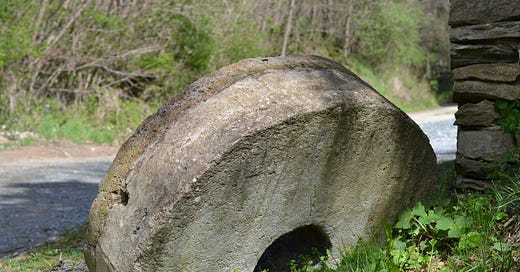Saint Martin of Tours was a soldier, who gave up his noble life to become a priest, and later bishop. Saint Teresa of Calcutta tells one of the more famous stories about him—
As an ordinary man in the world, he was riding along on his horse, when he saw a beggar shivering with the cold. Without a second thought, he took his sword and cut his mantle in half. That night, he had a dream in which he saw Jesus covered with his mantle.
Martin did not know that he was following Christ’s example, but this chance encounter miraculously led to his conversion anyway. He served as a great example of Christian charity for the rest of his life. And that’s what today’s readings are about—being (and following) good examples.
Reading 1
Ti 1:1-9
Paul, a slave of God and Apostle of Jesus Christ for the sake of the faith of God's chosen ones and the recognition of religious truth, in the hope of eternal life that God, who does not lie, promised before time began, who indeed at the proper time revealed his word in the proclamation with which I was entrusted by the command of God our savior, to Titus, my true child in our common faith: grace and peace from God the Father and Christ Jesus our savior.
For this reason I left you in Crete so that you might set right what remains to be done and appoint presbyters in every town, as I directed you, on condition that a man be blameless, married only once, with believing children who are not accused of licentiousness or rebellious. For a bishop as God's steward must be blameless, not arrogant, not irritable, not a drunkard, not aggressive, not greedy for sordid gain, but hospitable, a lover of goodness, temperate, just, holy, and self-controlled, holding fast to the true message as taught so that he will be able both to exhort with sound doctrine and to refute opponents.
The letter to Titus1 is one of the “Pastoral Epistles,” meaning it’s instructions for pastors on how to run their churches. It’s interesting for us to see how things were organized thousands of years ago, but there’s more to it than that.
The standards for becoming a priest (which they called “presbyters” at the time) are understandably high. They have to be examples for not only their parishioners, but also for all non-believers to see the goodness of God exemplified in the Church.
One of the slight difference between Paul’s time and now is priestly celibacy. That requirement only became widespread in the 12th Century. So one of the standards Paul has that we don’t is being a good earthly father to natural children. After all, if you can’t be a father to your own family, how can you be a father to a whole parish?
Responsorial Psalm
Ps 24:1b-2, 3-4ab, 5-6
R. (see 6) Lord, this is the people that longs to see your face.
The LORD's are the earth and its fullness;
the world and those who dwell in it.
For he founded it upon the seas
and established it upon the rivers.
R. Lord, this is the people that longs to see your face.
Who can ascend the mountain of the LORD?
or who may stand in his holy place?
He whose hands are sinless, whose heart is clean,
who desires not what is vain.
R. Lord, this is the people that longs to see your face.
He shall receive a blessing from the LORD,
a reward from God his savior.
Such is the race that seeks for him,
that seeks the face of the God of Jacob.
R. Lord, this is the people that longs to see your face.
This psalm is sung as part of a procession into the Temple. Interestingly, in the original Hebrew, the line “He whose hands are sinless…” is actually a collective noun, referring to the entire crowd. They all join together as one, to follow God inside. Without a proper leader, a crowd becomes a mob.
Alleluia
Phil 2:15d, 16a
R. Alleluia, alleluia.
Shine like lights in the world,
as you hold on to the word of life.
R. Alleluia, alleluia.
We must be examples to the world, and not just follow examples.
Gospel
Lk 17:1-6
Jesus said to his disciples, "Things that cause sin will inevitably occur, but woe to the one through whom they occur. It would be better for him if a millstone were put around his neck and he be thrown into the sea than for him to cause one of these little ones to sin. Be on your guard! If your brother sins, rebuke him; and if he repents, forgive him. And if he wrongs you seven times in one day and returns to you seven times saying, 'I am sorry,' you should forgive him."
And the Apostles said to the Lord, "Increase our faith."
The Lord replied, "If you have faith the size of a mustard seed, you would say to this mulberry tree, 'Be uprooted and planted in the sea,' and it would obey you."
Just as a good example can be a blessing, a bad example can create great harm. The abuses of some priests in recent decades were gravely sinful, and should be condemned. But instead, some bishops decided to pile scandal atop sin and hide the abuse.
This ripple affected a great many believers, turning them away from the church, while giving further ammunition to non-believers. As Jesus said, sin will happen, but if you’re the one participating in it, allowing it to happen, you’d be better off drowned in the sea.
We, the flock, must retain our faith despite bad leadership. The clergy are humans, and will inevitably falter, so we must look past them to Jesus Himself. Our good example can have positive effects within and outside the Church, as well.
Along with the two letters to Timothy.



